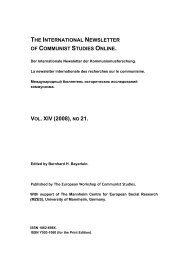11RXNdQ
11RXNdQ
11RXNdQ
You also want an ePaper? Increase the reach of your titles
YUMPU automatically turns print PDFs into web optimized ePapers that Google loves.
Colonialism and Neocolonialism 76<br />
and massacre the fine sons of Europe with the sole aim of becoming European like them?<br />
In short, we encouraged this melancholy and were once not averse to awarding the Prix<br />
Goncourt to a negro: that was before 1939.<br />
Now listen in 1961. ‘Let us not waste time on sterile litanies or on nauseating mimicry.<br />
Let us quit this Europe which talks incessantly about Man while massacring him<br />
wherever it meets him, on every corner of its own streets, in every corner of the world.<br />
For centuries … in the name of a supposed “spiritual adventure”, it has been suffocating<br />
almost the whole of humanity.’ This tone is new. Who dares to adopt it? An African, a<br />
man of the Third World, a former colonial subject. He adds: ‘Europe has reached such a<br />
mad and uncontrollable speed … that it is heading towards an abyss from which it would<br />
be better to move away.’ In other words: it has had it. This is a difficult truth to admit, but<br />
one of which we are all – are we not, my dear fellow continentals? – convinced deep<br />
down.<br />
We must express a reservation, however. When a French person, for example, says to<br />
other French people: ‘We’ve had it!’ – which, as far as I know, has been happening more<br />
or less every day since 1930 – it is a passionate discourse, burning with rage and love; the<br />
orator puts himself in the same boat as all his compatriots. And then he generally adds:<br />
‘Unless …’. We can see clearly what this means: no further mistake can be made; if his<br />
recommendations are not followed to the letter, then and only then will the country<br />
disintegrate. In short, it is a threat followed by advice and these comments are all the less<br />
shocking because they spring from the shared national consciousness. When Fanon, in<br />
contrast, says of Europe that it is heading towards ruin, far from giving a cry of alarm, he<br />
offers a diagnosis. This doctor wishes neither to condemn it without hope – miracles can<br />
happen – nor to give it the means to recover: he notes that it is in its death throes, based<br />
on external observation and going by the symptoms he has been able to gather. As for<br />
treating it, no; he has other worries on his mind; he does not care whether it lives or dies.<br />
His book is scandalous for that reason. And if you murmur, in a joking and embarrassed<br />
way: ‘He’s giving us some stick!’, the real nature of the scandal escapes you: for Fanon is<br />
not giving you any ‘stick’ at all; his work – so burning hot for others – remains ice-cold<br />
for you; in it, the author often talks about you, but never to you. No more black Goncourt<br />
winners, no more yellow Nobel prizewinners: the time of colonized laureates will never<br />
return. A ‘French-speaking’ ex-native bends this language to new requirements, makes<br />
use of it and addresses only the colonized: ‘Natives of all underdeveloped nations,<br />
unite!’. What a decline: for the fathers, we were the sole interlocutors; the sons no longer<br />
even consider us as qualified interlocutors: we are the object of their discourse. Of<br />
course, Fanon mentions in passing our famous crimes – Sétif, Hanoi, Madagascar – but<br />
he doesn’t waste his effort condemning them: he uses them. If he dismantles the tactics of<br />
colonialism, the complex play of relations that unite and divide the colons from the<br />
‘metropolitans’, it is for his brothers; his goal is to teach them to outsmart us.<br />
In short, the Third World is discovering itself and talking to itself through this voice.<br />
We know that it is not homogenous and that we still find subjugated peoples there, others<br />
who have acquired a false independence, others who are fighting to win sovereignty, and<br />
others, finally, who have won total freedom but who live under the constant threat of<br />
imperialist aggression. These differences were born of colonial history, in other words, of<br />
oppression. Here, the mother country contented itself with paying a few feudal




